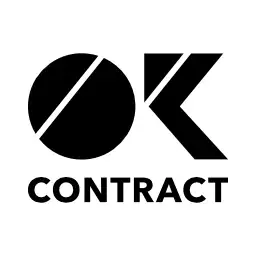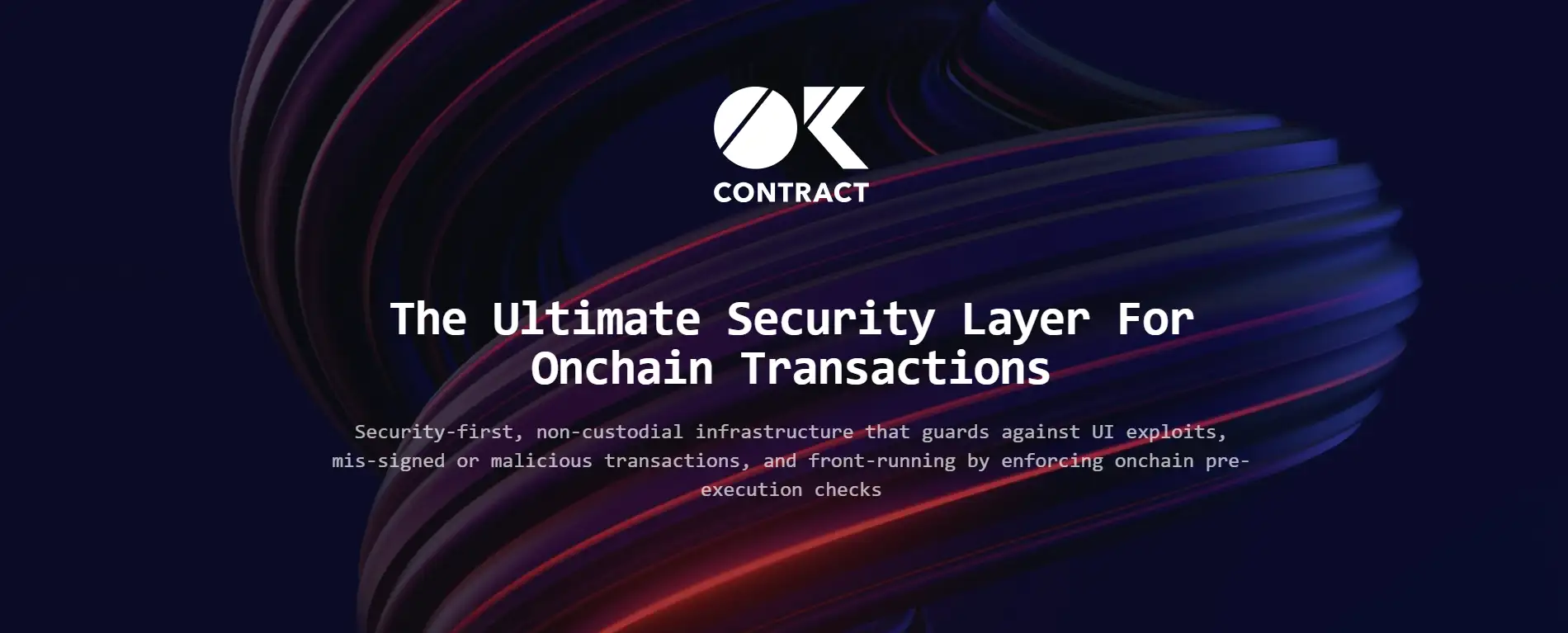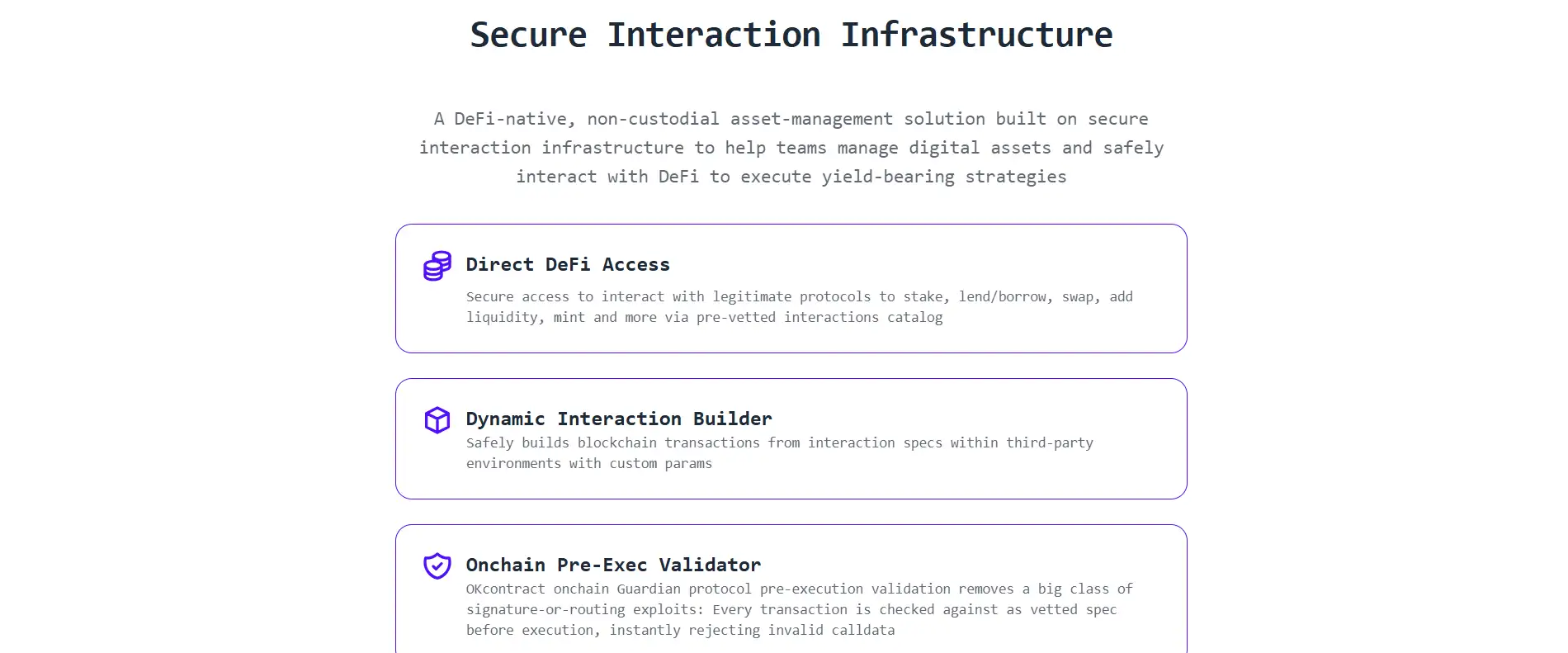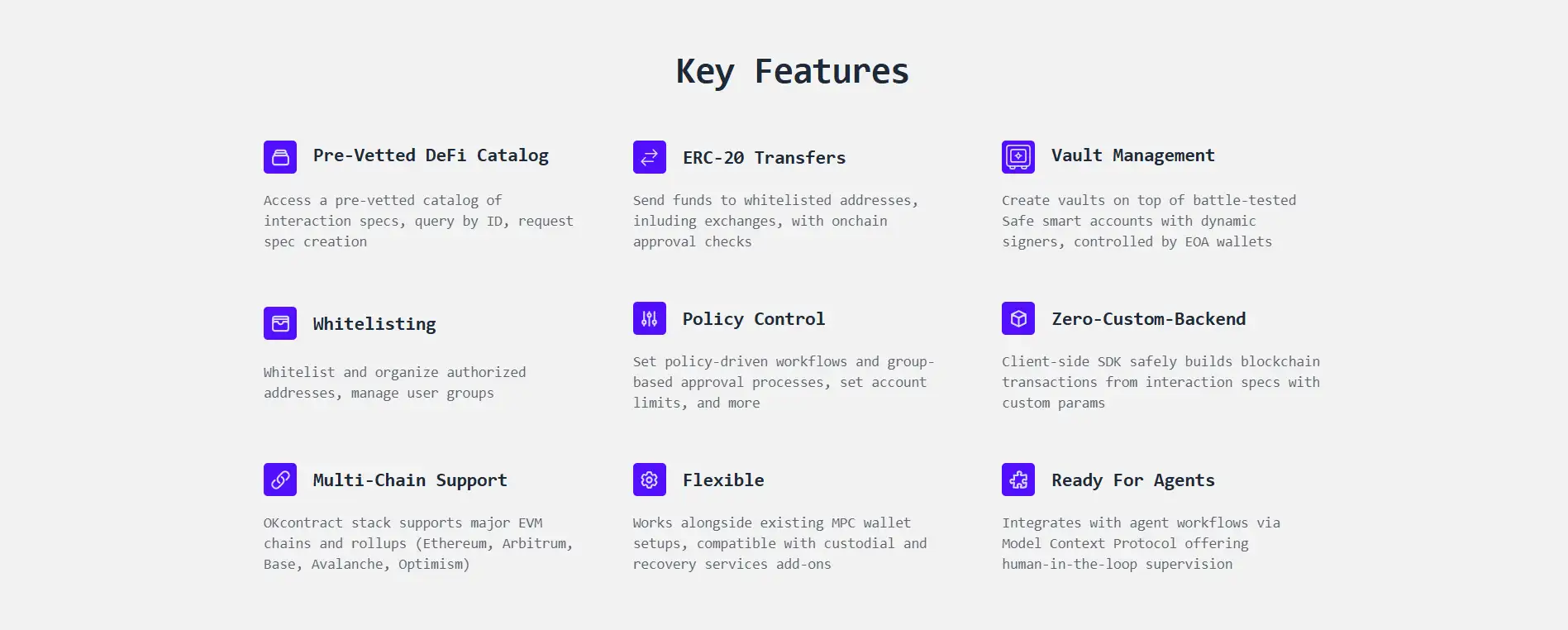About OKcontract
OKcontract is a Web3 infrastructure layer designed to simplify and automate smart contract interactions. The platform enables developers and AI agents to interact with blockchain-based contracts using reusable, low-code specifications and pre-built frontends. Rather than writing and maintaining custom interfaces and backends, users can leverage OKcontract to rapidly deploy smart contract functionality into applications or test environments.
With built-in support for EVM and non-EVM chains, auto-generated UI components, and developer-focused SDKs, OKcontract eliminates the overhead of manual blockchain integration. Its approach is secure, composable, and scalable—ideal for developers, dApps, tooling platforms, and AI-driven agents needing reliable and consistent interaction logic across protocols.
OKcontract redefines how developers interact with smart contracts by providing a full-stack interaction layer that connects blockchain protocols with user-facing applications and autonomous agents. Traditionally, integrating blockchain functions into apps requires frontends, ABI parsing, data handling, and manual transaction creation. OKcontract abstracts all of this through a composable, low-code architecture built for scale.
At its core is the OKcontract Interactions Catalog, a growing library of curated and verified smart contract interactions. These interactions are standardized using a proprietary specification model that can be executed directly via pre-built UIs, embedded into third-party apps via the OKcontract SDK, or invoked by external AI agents and bots. From DeFi actions like swaps and staking to NFT minting and cross-chain data uploads, OKcontract supports a wide variety of onchain use cases.
The platform provides powerful tools including a Multichain RPC library, a UI component system (UIC), the Cells automation framework, and an attestations module using EAS (Ethereum Attestation Service) to validate specifications. By eliminating the need for developers to manually manage onchain data parsing, contract method formatting, and gas estimation logic, OKcontract significantly reduces integration time and risk.
OKcontract’s infrastructure is already compatible with major EVM networks like Ethereum, Arbitrum, Optimism, Polygon, Avalanche, Base, BNB Chain, Linea, and Fantom, with upcoming support for Starknet. Testnets such as Sepolia and Mumbai are also integrated. Compared to traditional interaction frameworks or contract toolkits, such as Wagmi or Thirdweb, OKcontract focuses on complete automation of frontend, backend, and middleware layers for any transaction type.
Used by DeFi protocols like Aave, Compound, Uniswap, and Re7 Labs, OKcontract enables direct interaction flows such as staking, liquidity provisioning, and multi-token swaps—all through one reusable specification. The future roadmap includes full decentralization of the stack, making it one of the most censorship-resistant and modular interaction frameworks available in Web3.
OKcontract delivers critical benefits and features that enhance smart contract accessibility across applications and tools:
- Pre-Built Interactions Catalog: Choose from curated, community-verified DeFi and NFT interactions such as staking, liquidity provision, token swaps, and vault deposits.
- Auto-Generated Frontends: Default UIs generated instantly for any whitelisted contract. Embed these directly into your app or test locally.
- Low-Code Reusability: Specify interactions once, then reuse across apps, agents, and interfaces with minimal configuration.
- SDK Integration: Use the OKcontract SDK to embed interactions or build plug-and-play modules for smart contract execution.
- Multi-chain Compatibility: Supports Ethereum, Polygon, Arbitrum, Avalanche, Base, and more, with support expanding to non-EVM chains like Starknet.
- Secure Attestations: Integrates with EAS to attest to specs and ensure every interaction is traceable and verifiable.
- Watchlists & Custom Requests: Bookmark interactions, whitelist new contracts/tokens, or request custom chain support directly.
OKcontract is designed for developers, researchers, and product teams looking to simplify smart contract execution across Web3. Here's how to get started:
- Explore the Catalog: Visit the OKcontract Catalog to browse ready-to-use interactions from Aave, Uniswap, Compound, Lido, and more.
- Test Interactions: Use the built-in frontend to simulate interactions and validate transaction behavior before deployment.
- Integrate via SDK: Head to the Developer Docs for instructions on integrating the SDK and embedding interaction modules into your frontend.
- Request Support: Submit forms to whitelist tokens/contracts, request interaction types, or add chain support via the main site.
- Use Watchlists: Bookmark high-usage contracts, protocols, and interactions to speed up workflow across your team or app.
- Join Private Beta: Apply to become a builder by contacting the team. OKcontract currently works with selected projects to onboard secure and verified specifications.
OKcontract FAQ
OKcontract abstracts the complexity of onchain development by offering auto-generated frontends and low-code interaction specs that can be reused across apps. Developers don’t need to write manual ABI calls, build backends, or handle gas and slippage logic. Instead, they select an interaction from the catalog and embed it directly or execute it via the SDK.
Yes. OKcontract supports multi-transaction flows, enabling complex sequences like swap + stake, or liquidity migration, to be bundled into one interaction spec. This allows developers to design DeFi workflows that mirror real user behavior without writing redundant code for each transaction type.
AI agents require structured, verifiable data to execute transactions reliably. OKcontract provides AI-ready specifications for smart contract interactions, reducing the risk of misidentification, hallucination, or code injection. The interaction catalog acts as a trusted reference layer that AI systems can call upon for safe execution across protocols.
Each interaction in OKcontract is attested using Ethereum Attestation Service (EAS), making it publicly verifiable. This ensures transparency and trust in how interactions are defined and executed. The short, auditable specs simplify code review and allow for decentralized validation by the community.
Yes. Developers can use the OKcontract SDK or UIC component library to embed pre-built interfaces for staking, swapping, minting, and more—no custom UI work required. These components automatically include all relevant logic, validation, and data fetching out of the box.
You Might Also Like












